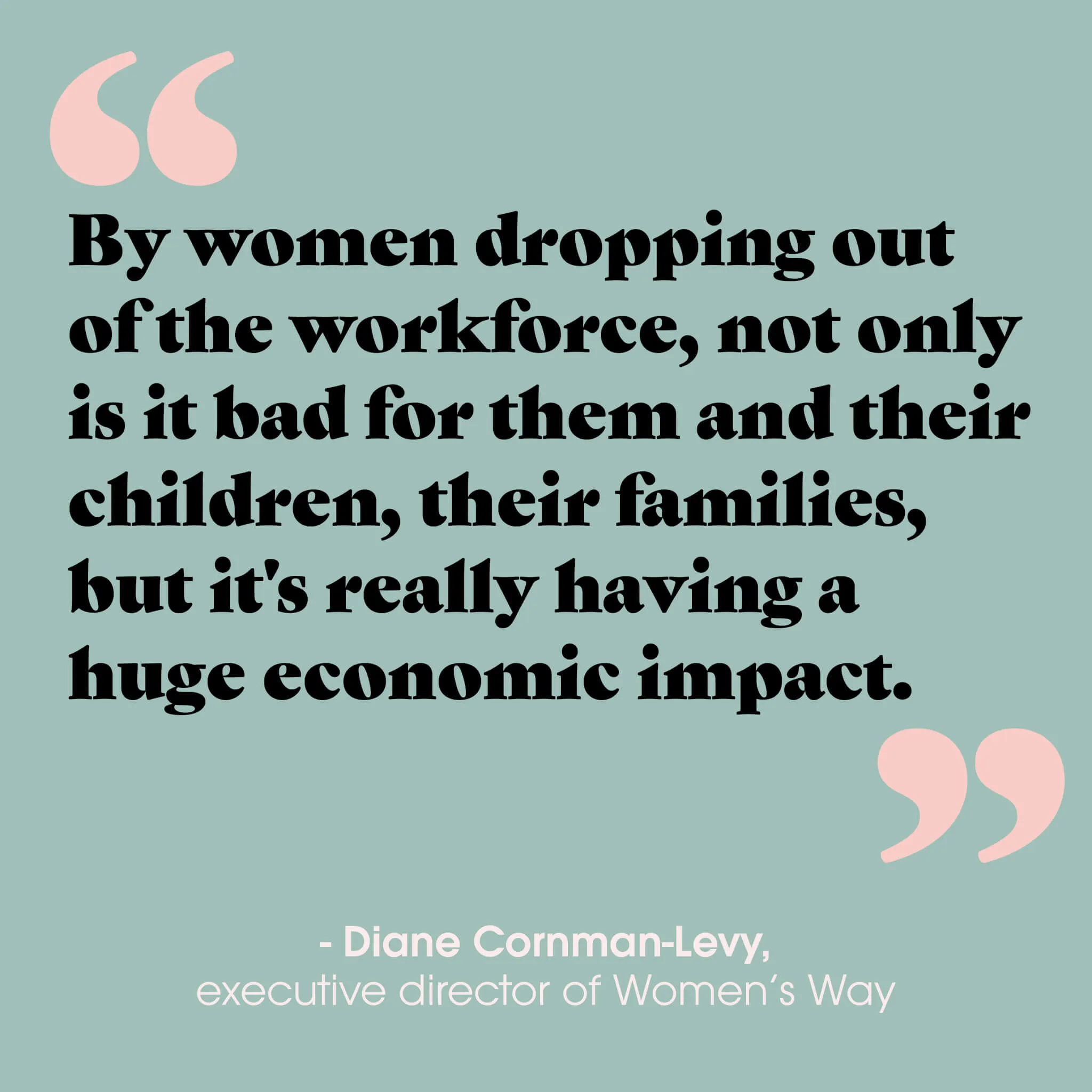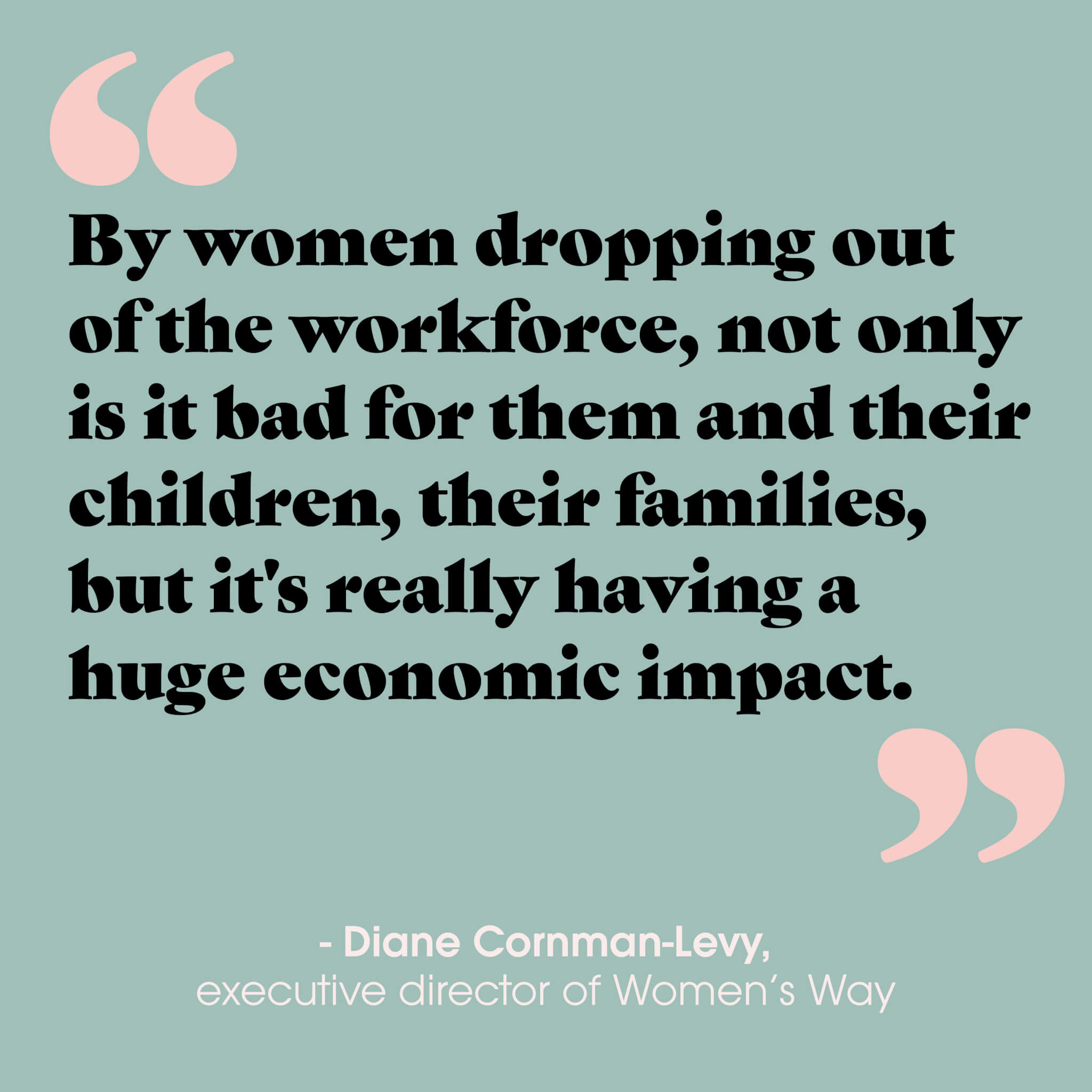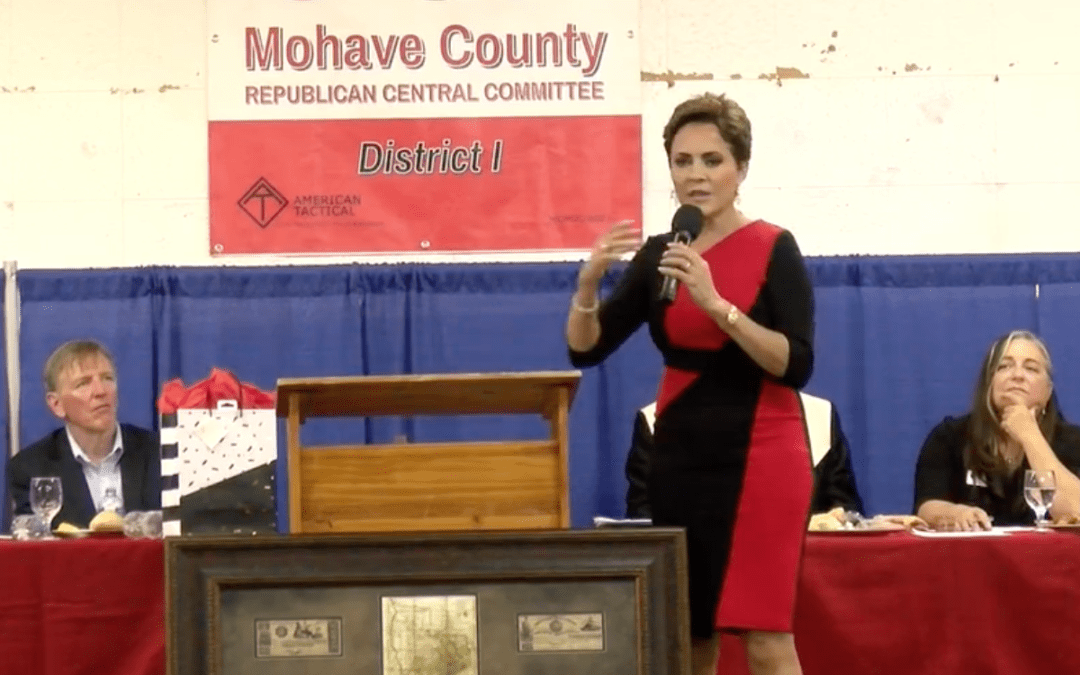
Women have borne the brunt of the pandemic’s economic toll, losing jobs and leaving the workforce in alarming numbers. Beginning with the passage of the American Rescue Plan, the Biden administration has made clear that addressing these disparities is one of its top priorities.
As the coronavirus pandemic wrecked the economy last March, Maria Lopez—like millions of many other Americans—lost her job. The travel and leisure sectors came to a screeching halt, and Lopez, 53, was furloughed from her job as a room attendant at the Westin Hotel in downtown Phoenix. She qualified for unemployment benefits, but the impact of losing work was still devastating for Lopez and her family.
“It was very difficult for all of us to be able to pay the mortgage,” Lopez said.
The Arizona resident is used to working hard, especially with such a large family: She and her husband have six children who range from nine to 36. “It wasn’t easy, but at least we were able to pay all the bills. It was stable,” Lopez said. “But after the pandemic, everything changed.”
While they were able to keep a roof over their heads, the couple fell behind on credit card payments and other bills. They struggled to help their 9-year-old daughter with remote learning—an experience Lopez described as “terrible.” Lopez also lost several friends to COVID-19 and spent a month sick herself with a nasty bout of pneumonia.
2020 was, simply put, a very bad year.

Lopez never gave up hope, however, and she and her family are slowly rebuilding their lives. After more than nine months off, she is back to work at the hotel. President Joe Biden’s recently-passed coronavirus relief package also provided her family with some much-needed help. They used their $1,400 stimulus checks to begin paying off some overdue bills. Beginning in July, she and her husband will also receive a $250 monthly payment to help provide for their daughter, thanks to the law’s expansion of the child tax credit.
“I’m so happy that the government is thinking about all of us, especially the kids,” Lopez said. “I think all of us need something, some kind of help because of the pandemic.”
That is particularly true for women. Lopez is one of tens of millions of American women who lost their jobs in what has been dubbed the “shecession.” Study after study has found that women, particularly women of color, have borne the brunt of the pandemic’s economic toll, losing jobs and leaving the workforce in alarming numbers. Now, more than a year into the pandemic, the Biden administration has made clear that addressing these disparities is one of its top priorities.
Treasury Secretary Janet Yellen addressed the crisis of women being left behind in the workplace this week, lamenting that “women’s economic history seems to be flowing backwards.” To address the economic inequities between the genders, “we must act,” Yellen wrote in a tweet..
That work, she continued, began with the American Rescue Plan.
But first, let’s take a look at how we got to this point.
‘Other Countries Have Social Safety Nets. The US Has Women.’
In February 2021, women held 5.1 million fewer payroll jobs than a year earlier. Over the same period, according to the most recent data from the Bureau for Labor Statistics (BLS), men held 4.4 million fewer jobs. More than 2.3 million women over the age of 20 also left the workforce during that time, compared to only 1.8 million men.
Perhaps no statistic highlights the pandemic’s inequitable economic toll better than what the Labor Department found in its December jobs report: That month, employers cut 140,000 jobs, with Black, Latino, and Asian women accounting for all of the job losses; overall, women lost 156,000 jobs while men gained 16,000. More than 150,000 Black women left the labor force altogether.
“This recession has been very different from previous ones,” explained Ariane Hegewisch, program director for Employment & Earnings at the Institute for Women’s Policy Research. That’s because the sectors where women, particularly Black and Latina, are more likely to work have been disproportionately affected by job losses. These industries include the leisure and hospitality, education and health services, state and local government, and retail sectors.
The closure of schools and daycares also forced many working mothers—who still provide the majority of child care—to take on greater roles as caregivers at home, either cutting back hours or leaving their jobs altogether.
“Some women we work with said, ‘You know what? It costs me more to work and pay for child care than to get unemployment,” said Diane Cornman-Levy, executive director of the Philadelphia-based nonprofit Women’s Way. “So some women have actually chosen to drop out of the workforce … and are actually doing better by getting unemployment.”
The grim reality is that the US lacks a sustainable, affordable, and accessible care infrastructure for families. As a result, families—and most often women—are forced to fend for themselves. That is a uniquely American experience, as sociologist Jessica Calarco pointed out in a recent interview with writer Anne Helen Peterson: “Other countries have social safety nets. The US has women.”
The loss of women in the workforce doesn’t just impact them; it also affects their families and society at large.

Prior to the pandemic, more than 40% of mothers were the sole or primary breadwinners for their families, according to the most recently available data. That includes more than two-thirds of Black mothers.
The suffering brought on by the pandemic will have a ripple effect too, reverberating for years. The low-wage jobs in leisure and hospitality might return more slowly than other jobs, Hegewisch said, while women in other industries may struggle to find comparable jobs and may wind up settling for less pay.
If families don’t get help with caregiving responsibilities and mothers continue to leave the labor force or reduce their work hours, it will come at a cost of $64.5 billion per year in lost wages and economic activity, Cornman-Levy said. “By women dropping out of the workforce, not only is it bad for them and their children, their families, but it’s really having a huge economic impact.”
More concerning to Hegewisch, however, is that employers may further discriminate against women for being mothers and choose not to promote them into management or other high-level positions.
The pandemic could also ultimately affect women’s ability to retire and live comfortably when they get older, as losing their jobs means they are unable to contribute to social security or other retirement options. “Sixty-five percent of people that are poor in retirement are women in this country,” Cornman-Levy said. “We are predicting this is going to increase because of the pandemic, so this has immediate, intermediate, long-term economic impact on women, families, and our country.”
The American Rescue Plan is ‘Real, Meaningful Action’
Less than one month after Vice President Kamala Harris demanded “a national solution” to the “national emergency” of women exiting the workforce in droves, President Biden signed the American Rescue Plan into law. The COVID relief package—which every single Republican in Congress voted against—directly addresses many of the issues driving the pandemic’s economic gender disparities.
Here’s just a sampling of what the $1.9 trillion plan provides:
- $1,400 stimulus checks for more than 85% of American households;
- $300 per week in federal unemployment benefits to the jobless through early September;
- $300 per month to most parents for each child between the ages of 0-5, and $250 per month for children ages 6-17;
- $360 billion to state and local governments, which employ a disproportionate number of women;
- a 15% boost in Supplemental Nutrition Assistance Program benefits through September and better access to fruit and vegetables for low-income mothers and their children;
- hundreds of billions of dollars to safely reopen schools;
- $21.6 billion in rental assistance for low-income renters;
- more affordable health insurance premiums for those obtaining health care via the ACA marketplace or COBRA program.
“These are all really good immediate things,” Cornman-Levy said of the law’s provisions.
Perhaps the most critical measure for helping women affected by the economic crisis, according to many experts, is the increased child tax credit, even though it’s currently only temporary for one year.
“It really gives money to households and families that have been hard hit, and it also addresses this big problem that we already had before the pandemic: that having kids is so expensive because child care often is so expensive and either you can’t pay for it or you can’t find it,” Hegewisch said.
She also praised the law’s funds for child care and child care support and money for state and local governments, which often provide women with good, stable jobs.
“This bill is both for the women dropping their kids off at daycare, and the women working in that daycare. It helps women who have left the workforce, and those still struggling to juggle it all,” Cecile Richards, a co-chair of American Bridge 21st Century and the former president of the Planned Parenthood Federation of America, wrote in a recent op-ed for Elle magazine. “It is real, meaningful action that will be felt by women in every community, whether it’s women who can’t afford healthy food or child care, or moms who are juggling work and helping their kids with Zoom classes.”
Yet the Fight for Gender Equity Continues
But more needs to be done to truly address the long-standing economic and societal inequities between men and women in the US. That includes “significant investments at both the state and federal level,” according to a recent report from the Institute for Women’s Policy Research, where Hegewisch works, such as improving the nation’s childcare infrastructure, an enhanced social safety net, and better jobs. Increasing the minimum wage to $15 per hour and enacting nationwide paid family and medical leave would be particularly transformative for efforts to reach gender equity.
“Many women are in jobs and they’re working full time, but they don’t have health benefits. They don’t have paid family leave. They don’t have paid overtime and many of the women are caregivers, so when their child gets sick or a family member gets sick, they actually have to leave work and they don’t get paid for it,” Cornman-Levy said. “That is a huge source of the gender wealth gap, particularly at the intersection of gender and race.”
As these political fights continue in the halls of White House and Congress, American women like Lopez will continue to pick up the pieces from a year that left them shattered. If the American Rescue Plan helps them do so, as expected, it could build further momentum for additional legislation, including a minimum wage hike and paid leave.
Lopez recognized months ago how important the federal government could be in delivering help to people like her. Knowing what a Democratic Senate majority could mean, she signed up for a paid position calling voters in Georgia nearly every day ahead of the state’s Senate runoff elections in January. Democrats Jon Ossoff and Raphael Warnock won those races and two months later, provided the decisive votes to pass the new COVID relief package.
“Every single day,” Lopez said, reflecting on her time volunteering, “my thought was ‘yesterday was bad, today will be better.’”
“I feel great that we did something for our country,” she added.
Now, with the American Rescue Plan, her country has done something for her.
Editor’s Note: A prior version of this story inaccurately stated that Lopez called Georgia voters in a volunteer capacity. In actuality, she took a paid position on an independent campaign. We regret the error.
Politics

Kari Lake calls on Arizona county sheriffs to enforce 1864 abortion ban
Republican candidate for US Senate Kari Lake on Saturday seemed to solidify her support for Arizona’s total abortion ban and called on county...

VIDEO: Arizona Rep. Greg Stanton ‘We will not stay silent’ on abortion ban
@coppercourier "Under this extreme law, women will die, and their doctors and nurses will be criminalized. This cannot stand," Rep. Greg...
Local News

6 terrifying things that could happen if the Comstock Act is used to target abortion
Does 1873 sound like a really, really long time ago? Well, that’s because it is—but if Republicans and far-right anti-abortion activists have their...

ASU football slapped with probation due to violations during Herm Edwards era
The violations described in the NCAA statement include impermissible in-person recruiting contacts while the state of college athletics was...




